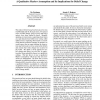Free Online Productivity Tools
i2Speak
i2Symbol
i2OCR
iTex2Img
iWeb2Print
iWeb2Shot
i2Type
iPdf2Split
iPdf2Merge
i2Bopomofo
i2Arabic
i2Style
i2Image
i2PDF
iLatex2Rtf
Sci2ools
111
click to vote
UAI
1996
1996
A Qualitative Markov Assumption and Its Implications for Belief Change
The study of belief change has been an active area in philosophy and AI. In recent years, two special cases of belief change, belief revision and belief update, have been studied in detail. Roughly speaking, revision treats a surprising observation as a sign that previous beliefs were wrong, while update treats a surprising observation as an indication that the world has changed. In general, we would expect that an agent making an observation may both want to revise some earlier beliefs and assume that some change has occurred in the world. We define a novel approach to belief change that allows us to do this, by applying ideas from probability theory in a qualitative settings. The key idea is to use a qualitative Markov assumption, which says that state transitions are independent. We show that a recent approach to modeling qualitative uncertainty using plausibility measures allows us to make such a qualitative Markov assumption in a relatively straightforward way, and show how the M...
| Added | 02 Nov 2010 |
| Updated | 02 Nov 2010 |
| Type | Conference |
| Year | 1996 |
| Where | UAI |
| Authors | Nir Friedman, Joseph Y. Halpern |
Comments (0)

